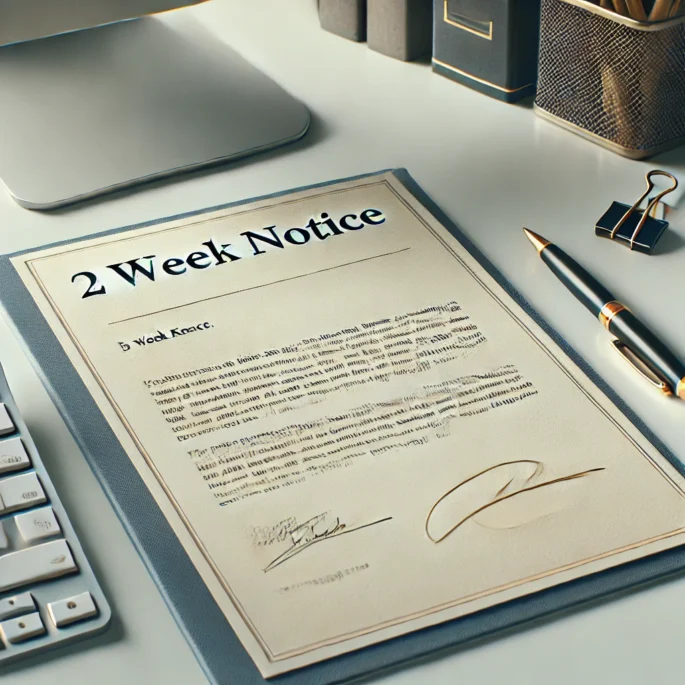How to Write a 2 Week Notice Letter: A Step-by-Step Guide
Introduction
A 2 week notice letter is an essential document when resigning from a job. Whether you’re leaving due to a new opportunity, personal reasons, or simply because it’s time for a change, a professional resignation letter is the best way to inform your employer. Writing a proper 2 week notice letter ensures you leave on good terms and maintain a positive professional reputation. In this guide, we will walk you through the key steps involved in crafting the perfect 2 week notice letter, including detailed advice, examples, and frequently asked questions.
Why You Need a 2 Week Notice Letter
When you decide to leave your job, it’s essential to provide your employer with a 2 week notice letter. Giving two weeks’ notice is the standard in most industries, providing your employer time to make arrangements for your departure, whether that’s finding a replacement or distributing your workload to others. Not providing notice can leave a bad impression and may affect your professional relationships.
A 2 week notice letter serves as a formal notification of your resignation, and it offers clarity and professionalism. It also helps you leave your current position with integrity and respect for your employer and colleagues. By following the proper format, you ensure that both parties can smoothly transition and move forward with minimal disruption.
Key Components of a 2 Week Notice Letter
A well-written 2 week notice letter includes several key components. Below are the steps to writing one that is both professional and concise.
1. Start with a Professional Greeting
The first part of your 2 week notice letter should include a formal greeting. Address your letter to your immediate supervisor or manager. Use a respectful salutation such as:
- Dear [Manager’s Name],
- Dear [Supervisor’s Name],
For example, if your manager’s name is John Smith, you can begin with:
- Dear Mr. Smith,
If you’re unsure who to address the letter to, you can simply use “To Whom It May Concern,” but addressing a specific person is always preferable.
2. State Your Intent to Resign
In the opening sentence of your 2 week notice letter, clearly state your intention to resign. Be direct but polite. Example:
- “I am writing to formally resign from my position as [Job Title] at [Company Name], effective two weeks from today, [Date].”
This makes it clear to your employer that you are resigning and includes your notice period.
Example:
- “I am writing to formally resign from my position as Marketing Manager at XYZ Corp, effective two weeks from today, January 15, 2024.”
3. Provide Your Last Working Day
It’s important to specify your last day of work to ensure clarity for both you and your employer. The last working day should be two weeks after the date of the letter. Example:
- “My last day of employment will be [Last Working Day Date].”
Example:
- “My last day of employment will be January 29, 2024.”
This gives your employer a clear idea of when to expect you to leave.
4. Express Gratitude
Even if you are leaving because of negative circumstances, it’s always a good idea to express some level of gratitude for the opportunity. You can thank your employer for the experience, the chance to work with a great team, or any specific skills you learned during your time with the company. Example:
- “I want to thank you for the opportunity to work at [Company Name]. I have enjoyed working with the team and appreciate the valuable experiences gained here.”
For example:
- “I want to thank you for the opportunity to work at XYZ Corp. I have enjoyed working with the marketing team and have learned a great deal about digital marketing strategies during my time here. I’ll always value the experience and the support I received from you and my colleagues.”
This will help you leave on a positive note.
5. Offer to Help During the Transition
It’s always helpful to offer to assist during the transition period, whether that’s training your replacement or helping to complete ongoing projects. This shows professionalism and leaves a positive impression. Example:
- “I am happy to assist in the transition process and will do everything I can to ensure a smooth handover of my responsibilities.”
Example:
- “I am happy to assist in the transition process and can help train my replacement, wrap up ongoing campaigns, or answer any questions to ensure a smooth handover.”
6. Close with a Formal Sign-Off
End your 2 week notice letter on a polite and professional note. A common closing phrase would be:
- “Sincerely,”
- “Best regards,”
- “Kind regards,”
Then, sign your name underneath. Example:
- Sincerely,
[Your Name]
Sample 2 Week Notice Letter
Here’s a complete sample of a 2 week notice letter for reference:
Dear Mr. Smith,
I am writing to formally resign from my position as Marketing Manager at XYZ Corp, effective two weeks from today, January 15, 2024. My last day of employment will be January 29, 2024.
I want to thank you for the opportunity to work at XYZ Corp. I have enjoyed working with the marketing team and have learned a great deal about digital marketing strategies during my time here. I’ll always value the experience and the support I received from you and my colleagues.
Please let me know how I can assist in the transition process. I am happy to help with training my replacement, wrapping up ongoing campaigns, or answering any questions to ensure a smooth handover of my responsibilities.
Thank you again for the opportunity, and I wish the company continued success in the future.
Sincerely,
[Your Name]
Common Mistakes to Avoid in a 2 Week Notice Letter
When writing your 2 week notice letter, it’s important to avoid common mistakes that could impact your professionalism and reputation. Here are a few things to keep in mind:
1. Being Too Negative
Even if you’re leaving due to frustration or dissatisfaction with the company, avoid airing grievances in your resignation letter. Keep the tone positive and professional to avoid leaving a negative impression.
2. Not Following Company Policy
Check your company’s resignation policy before submitting your letter. Some companies require more or less than two weeks’ notice, so it’s essential to be aware of their expectations.
3. Failing to Offer Help During the Transition
Leaving your team in a difficult situation can negatively impact your relationship with your employer. Always offer to assist in the transition.
FAQs About 2 Week Notice Letters
Q1: Do I have to provide two weeks’ notice?
While two weeks is the standard, some employers may accept a shorter notice period, or in some cases, you may need to give more notice. It’s best to check your company’s policy and consider the nature of your role.
Q2: Can I resign without giving a 2 week notice letter?
While it’s legally possible to leave without giving notice, doing so may harm your professional reputation and future job prospects. It’s always best to give your employer proper notice.
Q3: Should I explain why I’m leaving in my 2 week notice letter?
You are not required to explain the reasons for your resignation. However, if you feel comfortable, you may briefly mention why you’re leaving (e.g., career advancement, personal reasons, etc.).
Q4: Is it necessary to send the letter via email or in person?
It’s ideal to provide the 2 week notice letter in writing, either via email or a printed letter. If possible, it’s courteous to inform your employer in person first before submitting the formal letter.
Q5: What if I want to leave sooner than two weeks?
If you need to leave before the standard two-week period, it’s important to discuss it with your employer and give as much notice as possible. If agreed upon, you can adjust the timeline accordingly.
Conclusion
Writing a 2 week notice letter is an important part of leaving a job professionally. By following the steps outlined above and ensuring you maintain a polite and positive tone, you can resign with dignity and leave a lasting impression on your employer. Remember, a well-written resignation letter not only helps you exit smoothly but also ensures that you retain positive relationships with your current employer for future references.
By keeping your letter clear, concise, and professional, you maintain your credibility and position yourself well for any future opportunities. Following these guidelines ensures a respectful departure, making it easier to transition to the next phase of your career.


Post Comment